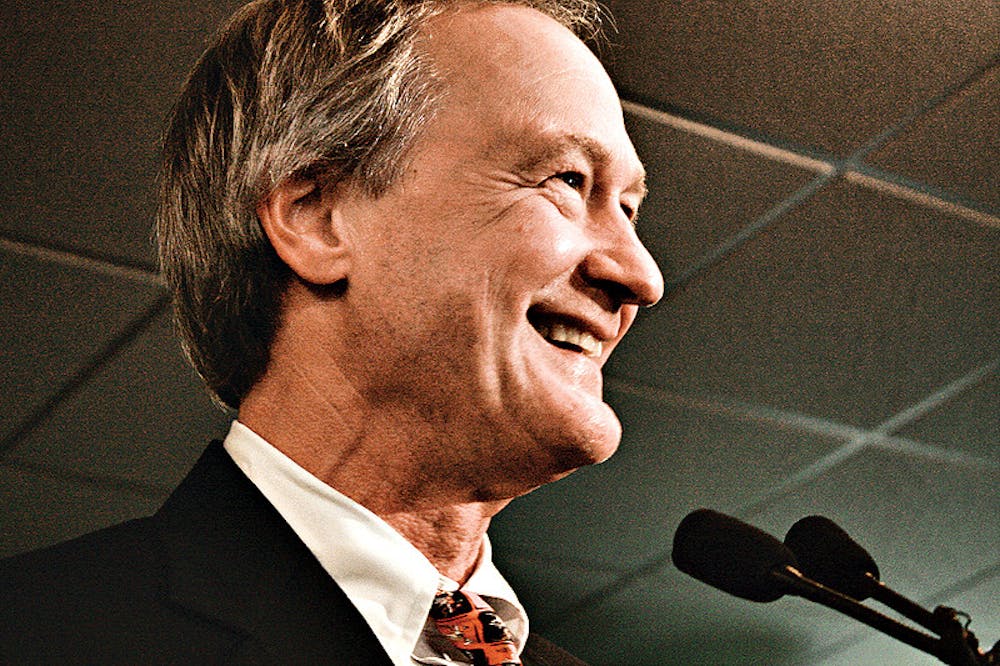Former Rhode Island Gov. Lincoln Chafee ’75 P’14 P’17 announced Thursday that he has formed an exploratory committee to consider a 2016 presidential run. His potential bid is not anticipated to gain much traction in a race for the Democratic nomination that would pit him against frontrunner Hillary Clinton, who launched her campaign Sunday.
Chafee’s announcement video emphasized his hopes of mending the United States’ relationship with other nations through improved foreign policy, while also providing stability and safety for Americans. “As we look to the future in this age of nuclear weapons, I am alarmed about the international instability, especially in the Middle East and North Africa. I don’t like where this is going,” Chafee said in the video.
“This may simply be an effort to promote his image — and sell a few books along the way,” wrote Philip Bump, a writer for the Washington Post’s daily political blog, The Fix, Thursday. An advertisement to buy Chafee’s book, “Against the Tide,” which was published in 2008, is prominently placed on his website, Chafee2016.com, Bump noted.
Chafee began his career in state politics as a delegate to the Rhode Island State Constitutional Convention in 1985 before being appointed to his father John Chafee’s U.S. Senate seat upon his death in 1999. Chafee won the same Senate seat as a Republican in the 2000 election, though he lost to Democrat Sheldon Whitehouse in 2006. After being elected governor of Rhode Island as an Independent in 2010, Chafee declined to run for reelection in what promised to be a competitive primary battle in the Democratic party, which Chafee joined during his term.
Despite Chafee’s long-standing involvement in state politics, his announcement came as a surprise to many. “I was completely shocked,” said Bob Plain, editor and publisher of the political blog RI Future. “Last year, I interviewed (Chafee) … and asked him if he had any other political ambitions, and it never occurred to me to ask if he considered running for president or not.”
“I guess what he’s thinking is that there is a vacuum, that Hillary Clinton has no opposition on the Democratic side yet, and … he sees an opening,” said Richard Arenberg, adjunct lecturer in public policy and political science.
Chafee’s multiple switches in party affiliation also mark a controversial aspect of his career. He left the Republican Party in 2007 and joined the Democrats in 2013. This may make it difficult for Chafee to “convince Democratic primary electorates to vote for him,” especially when paired with an apparent lack of popularity, Arenberg said.
Chafee’s approval ratings hovered around 25 percent during his final year as governor. “He really hasn’t earned his stripes in the Democratic Party yet,” Arenberg said.
But some argue that despite his move across the political spectrum, Chafee’s values have not really changed. “I think the beauty of how Linc Chafee has changed his affiliations over the years is that he did so without ever changing his principles,” Plain said. “It’s not hard to lay out the case for how the Republican Party left Linc Chafee more than Linc Chafee left the Republican Party.”
In response to Chafee’s announcement, several students formed Brown Students for Chafee last week with the goal of spreading “Chafee’s message of good governance and rational foreign policy around campus,” group members wrote in an email to The Herald. If Chafee proceeds with his run for president, the group intends to “serve as a conduit between his campaign and students” and will meet Chafee in “Iowa, New Hampshire and beyond to help get out the vote,” group members wrote.
Chafee took a strong stance against the Iraq War in 2002 and cited this decision in his video as evidence of his ability to make good judgments in high-pressure situations. In an interview Sunday with CNN, Chafee sharply criticized Clinton, who voted in favor of the Iraq War, for her lack of insight on international policy issues. “She didn’t do her homework,” he said, adding, “You may say that’s 12 years ago — that’s a big motivator for me running. If you show a lack of judgment, … then what can we expect in the future?”
Adam Toobin ’15, one of the founders of Brown Students for Chafee and a former Herald managing editor, wrote in an email to The Herald that he agrees with Chafee’s view that the United States should have avoided military intervention in 2003. “The Democratic Party should not be the party of the Iraq War,” he wrote. “Chafee was right on Iraq, and he shares my domestic priorities of using government to correct historic wrongs and support the country’s most disadvantaged citizens.”
On the other hand, dwelling on an event that happened over a decade ago will not help Chafee overcome Clinton’s popularity, Arenberg said. “It’s difficult to base a campaign on a vote (Clinton) cast 13 years ago. She has long ago acknowledged that it was a mistake,” he said. In addition, Chafee voted for the Levin Amendment, which “authorized the use of force” contingent on the United Nations Security Council’s support for the mission, so “it’s not quite as black and white a vote against the Iraq War as it is sometimes purported to be,” he said.
Arenberg remains skeptical about Chafee’s chances of success, saying, “It’s a very extreme long shot for him.”





